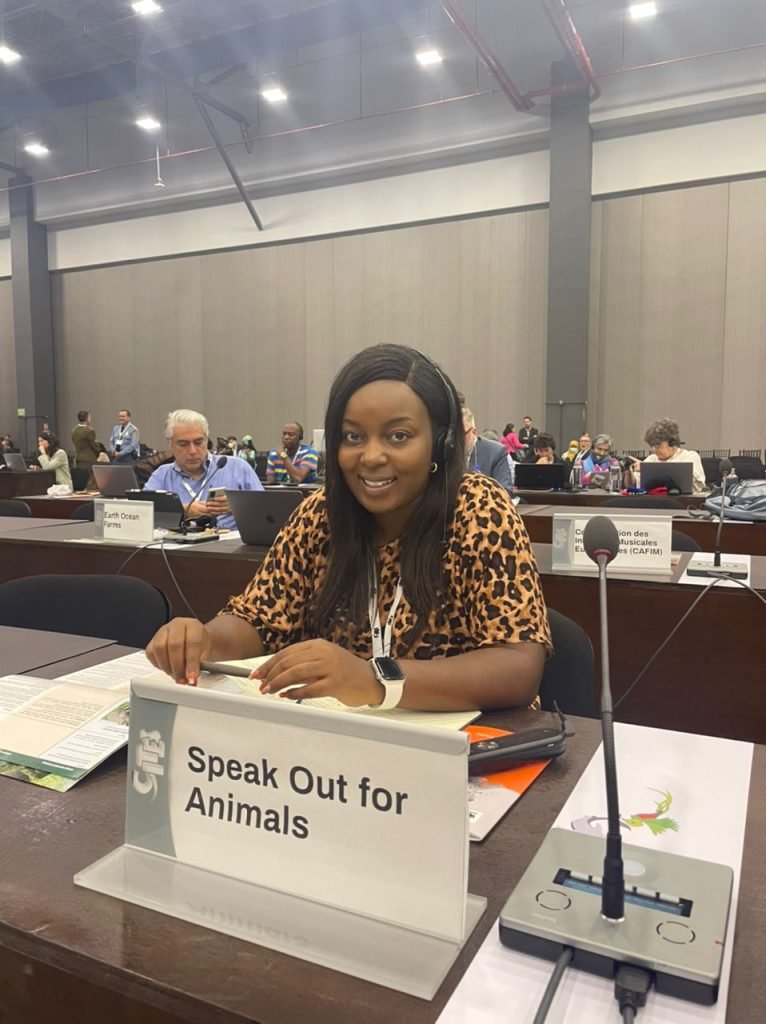Woman-led legal organisation fights for animal rights in Zimbabwe
As first appeared in Enviropress in Zimbabwe, here. Written by Mary Mundeya.
December 21 2022
Securing status of wild dogs as specially protected animals is one of the many achievements under SOFA’s belt
Ever Chinoda is an environmental lawyer and the founder of Speak Out For Animals.
I
mage by SOFA.
Zimbabwe’s wildlife landscape is gifted with 350 species of mammals, more than 500 birds, and 131 fish species all of which adorn its environment, yet due to the increasing number of poaching cases, the wildlife is seriously threatened.
According to the Africa Wildlife Foundation (AWF), elephants, rhinos and other iconic African wildlife may be gone within our lifetime.
According to a United Nations (UN) 2030 Agenda for Sustainable Development report, despite 15 percent of the land being protected, biodiversity is still at risk. The UNDP 2021 report also stated that approximately 7,000 species of animals and plants are traded illegally.
“Wildlife crime is now rampant in most Southern African countries,” says Ever Chinoda International Animal Law Advocate and founder of Speak Out for Animals Trust (SOFA), an organisation of young passionate animal lawyers who are committed to combating wildlife crime, using the legal system.
The female-led SOFA is one of Zimbabwe’s leading animal conservation organisations that has for years been striving to promote Animal Law awareness in a bid to achieve protection of animals, raising awareness for the preservation and value of flora and fauna guided by the laws that protect them.
“Our mission as Speak Out for Animals is to influence the human mindset and inspire behavioural change towards animal protection and preservation laws in Zimbabwe.
“Appreciation of Animal Law is not widespread in our country and in Africa, hence the work we do is pivotal in changing this narrative,” says Chinoda.
Founded in 2017, SOFA through case monitoring, legal awareness training, projects linked to animal law, educating students through student chapters and legal literature (wildlife) development has immensely contributed to sustainable protection and the better handling of wildlife crime cases in Zimbabwe.
“We conduct monitoring of animal (domestic and wildlife) cases in courts across Zimbabwe’s 10 provinces. This entails watching in brief and advising relevant stakeholders on gathering of evidence, proper drafting of the charge sheet, ensuring that the accused is brought before the court within 48 hours arguments with a goal to attain a befitting sentence, thus rendering justice for animals. For the past three years, we have assisted over a hundred cases,” she says.
“Currently in Zimbabwe, there is no law school that offers animal law as a course for study and to cover the gap, SOFA conducts animal law training for law students, practising lawyers, prosecutors and judicial officers to equip them with knowledge in animal law. We have also introduced wildlife law as a module at the University of Zimbabwe and the Great Zimbabwe University where I’m lecturing with the hope of catching future magistrates and prosecutors whilst they are still practising,” Chinoda said.
The law is an essential mechanism for protecting animals and many times loopholes in it are used against them. For years, SOFA has also been advocating for the reform of Zimbabwean wildlife laws to align them with international treaties to which the country is party to.
“Through our lobbying efforts, the wild dog was listed as a specially-protected animal for the first time through Statutory Instrument 71 and 72 of 2020. We have also successfully managed to lobby for the change of classification of the painted dog / wolf-dog from problem animal to endangered with the aid of organisations like Painted Dog Conservation.
“Going forward, we are aiming for the creation of an Environmental-Wildlife Court, a development we see as imperative if the conservation of flora and fauna in Zimbabwe is to be attainable,” she added.
This article is reproduced here as part of the African Conservation Journalism Programme, funded in Angola, Botswana, Mozambique, and Zimbabwe by USAID’s VukaNow: Activity. Implemented by the international conservation organisation Space for Giants, it aims to expand the reach of conservation and environmental journalism in Africa, and bring more African voices into the international conservation debate. Written articles from the Mozambican and Angolan cohorts are translated from Portuguese. Broadcast stories remain in the original language.

